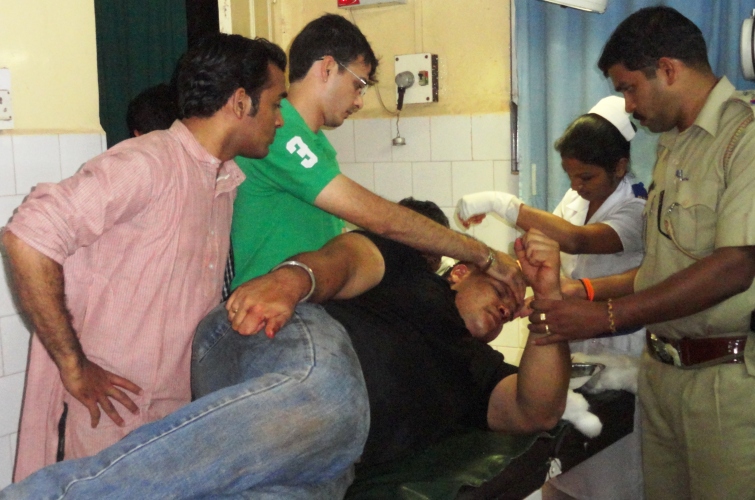Cites prosecution failed to prove lawful duty; alleged poll boycott angle was EC domain, not police

File photo of the CID personnel undergoing treatment after the assault at the Velim Church in February 2012.
MARGAO
As the Velim Church attack case has ended in an acquittal after a decade-old trial, observations made by the Judicial Magistrate First Class, Margao while acquitting all the 22 accused persons, has held that the visit of the three CID police personnel at the residence of the Parish Priest of St Xavier’s Church, Velim and that too at late hours was an unwarranted and unauthorised entry.
Observation made by Judicial Magistrate First Class, Margao, Sunita Gaunekar in the order dated October 30 in respect to the entry of the three CID police personnel at the Velim Church assumed significance as the police had claimed that they had gone to find out whether Velim villagers would boycott the Assembly election.
In fact, the Judge has categorically stated that it is crystal clear that the CID personnel was not having any authority to enter the office of the Church, saying the prosecution failed to prove that the CID personnel was discharging his lawful duty on the day of the alleged incident and his entry in the church at that particular time was an unauthorised entry.
“Although it is a case of the three CID personnel that were performing their duty on the day of the alleged incident, however neither station diary nor the muster roll, duty chart nor any document has produced on record to show that they were discharging their lawful duty on the alleged date, time and place of incident,” the Judge said.
On the prosecution claim that the three CID personnel had gone to the Velim Church to find out about any boycott of the election, the Judge observed “from the testimony of the CID personnel, it is clear that even if there was decision of boycotting the elections, it was for the Election Commission to look into the matter and sort out the issue and not the police personnel. Still the personnel visited the residence of the Priest.”
The judge added: “Even otherwise, the prosecution failed to show that boycotting the elections attracts the penal provisions. PW-11 has also deposed that he does not know under which crime the person has to be booked if he boycotts elections. Hence, in such circumstances, the visit of PW-11, PW-12 and PW-13 at the residence of the priest that too at late hours was an unwarranted and unauthorised entry.”
The Judge further pointed out that although, it is the case of the prosecution that PW-11 (CID personnel) had gone to the residence of the priest in order to collect the information as regards to the boycotting of elections, however, there is no evidence on record or any complaint against the priest to show that the priest was responsible for alleged boycotting of elections. “Hence, there was no reason for PW-11 to visit the residence of the said priest for making inquiries with that respect,” the Judge added.
The judge added: “Even otherwise, if it is presumed that the SP had instructed him to collect intelligence information from the Velim village as regards the boycott of the election, it was for PW-11 to collect the information by other means/ sources and not by unauthorisedly visiting the residence of the priest at late hours of night. Hence, the visit of PW-11 and two other police personnel at late hours of the night was an unauthorised visit.”
Asserting that the CID personnel was not having any authority to enter the office of the Church, the judge said the prosecution failed to prove that PW-11 was discharging his lawful duty on the day of the alleged incident and his entry in the church at that particular time was an unauthorised entry.
“Although it is a case of PW-11 that he, PW-12 and PW-13 were performing their duty on the day of the alleged incident, however neither station diary nor the muster roll, duty chart nor any document has been produced on record to show that they were discharging their lawful duty on the alleged date, time and place of incident.”